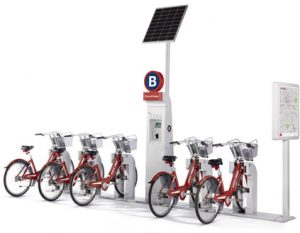
B-cycle – Website, App
What It Is: Bike sharing, short-term bike rental
Fees: Denver B-cycle is priced to encourage short trips of 30 minutes or less, which are included free with each membership. Checkouts of 30-60 minutes cost $1, beyond this, users are charged $4 per additional 30-minute period.
Membership Options:
- 24-Hour: $9
- 30-Day: $15
- Annual: $90
- Senior, Student and Military: Contact B-cycle for information
Source: https://denver.bcycle.com/pricing.aspx, accessed 1/1/2015
Hours of Operation: Denver B-cycles are currently available 12 months a year, 7 days a week, 5 a.m. to midnight.
Good to Know: You must have an access pass or membership to check out bikes. A 24-hour access passes can be purchased at any B-station. Denver does allow people to ride without a helmet, but Denver B-cycle certainly encourages helmet use.
Plan Your Trip: Is B-cycle right for you? Check out the map of locations to see if there’s a station near you and your favorite destinations: B-cycle Station Map
What We Love: It’s a magic bike! There when you need one, gone when you don’t! The stations seem convenient to where we want to go and paying $90 for a whole year of unlimited 30-minute rides (you can ride from one station to another and swap bikes in order to stay in the 30-miniute free zone) is a great deal. Riding a B-cycle is transportation and exercise all in one and the bikes adjust easily to accommodate riders of different sizes.
Possible Drawbacks: We’re by no means hardcore cyclists and so the thought of riding through the snow or being on the roads with lots of traffic as we head downtown sound pretty daunting. While the bikes do come with a handy basket in front, we often need more storage capacity than a basket and backpack could provide. While B-cycle closely monitors bike supplies at all of its stations to ensure there are bikes to take and spaces to return, we wonder how often we’d face an issue getting a bike or returning one.
Car2Go – Website, App
What It Is: Car sharing, short-term car rental
Fees: No monthly fees or rental subscription packages. After the sign up fee, Car2Go usage is billed by the minute.
- One Time Sign Up Fee: $35 plus tax
- Per Minute: $0.41 plus tax
- Per Hour: $14.99 plus tax
- Per Day Maximum: $84.99 plus tax
Source: https://www.car2go.com/en/denver/what-does-car2go-cost/#tid=cost, accessed 1/1/2015
Hours of Operation: 24 hours a day, 365 days a year.
Good to Know: Car2Go fees include gas and drivers don’t have to pay for parking in most situations (there’s a whole document detailing proper parking that users must review before using one of the cars). If you’re running an errand and want to be sure your Car2Go is right where you left it, you can put the car on hold (there is a charge for hold minutes) while you go into a store.
Plan Your Trip: A smart first step when considering if Car2Go is right for you is to take a look at the Car2Go map to see if there are cars near your starting point and/or destination. Get a sense of how much your drive will cost by using Google maps to estimate the drive time of your route and then multiplying the time estimate by $0.41/minute. Car2Go Map
What We Love: A car when you need it and then gone when you don’t! Paying only for the minutes you use and enjoying free parking all over town (in zones that are 2-hours and more, metered or unmetered and at dedicated parking spots) and never having to fear a parking ticket sounds pretty great to us.
Possible Drawbacks: The cars are small, so Car2Go means only 2 people can ride and there’s limited hauling capacity. Also, there have been times when we checked the Car2Go location map only to find that the nearest car was a 20 minute walk.
Zipcar – Website, App
What It Is: Car sharing, short-term car rental

Occasional Driver (Zipcar says this is their most popular plan):
- One Time Sign Up Fee: $25
- Annual Membership
- Per Hour: From $9 (MON-THU), $10 (FRI-SUN)
- Per Day: From $73 (MON-THU), $80
Source: https://www.car2go.com/en/denver/what-does-car2go-cost/#tid=cost
Hours of Operation:
Good to Know: Zipcars must be returned to their designated parking place. This means that one-way trips are not possible. Also important to know is that the cars must be booked ahead of time and returned on time. If you return your car late, you will be charged late fees starting at $50.
Plan Your Trip: A smart first step when considering if Zip Car is right for you is to take a look at the Zipcar map to see if there are cars near your starting point and/or destination and if you like the make and model of these cars. Zipcar Map
What We Love: There are a variety of vehicles available through Zipcar from BMW SUVs with navigation to Minis, Priuses and pickup trucks. The Zipcar reservation system means you know the car will be there when you’ve booked it.
Possible Drawbacks: Having to return a car to a designated spot. The reservation system with Zipcar makes it easy to plan ahead, but it also could feel rigid to more casual commuters. The late return fees could be a problem if a meeting runs long or you end up in the slow line at the grocery store. Currently, there are no Zipcars in Denver (cars vary city to city) that accommodate more than 5 people, so transporting a large group on a special occasion might also be an issue.
RTD – Website
What It Is: A system of buses, shuttles and light rail trains serving the Denver region
Fees: RTD fees vary by zone. For travel in/near downtown Denver (zones 1-2), here are the options from purchasing a single ticket for bus or to purchasing an annual membership. Higher fares apply to travel to father from downtown.
Local/Limited Bus or Light Rail in Zones 1-2:
- One-Way Ticket: $2.25 ($1.10*)
- Ten-Ride Ticket Booklet: $20 ($10*)
- Monthly Pass: $79 ($39.50*)
- Annual ValuPass: $896 ($434.50*)
*Discount fares apply to all seniors 65+, individuals with disabilities, Medicare recipients, and students in elementary, middle and high school, ages 6-19. Proof of eligibility is required when boarding. Seniors and individuals with disabilities may obtain a special discount card. Children 5 years of age or younger ride free (limit 3 children for each fare-paying adult). Members of the US military on active duty currently ride for free on all RTD services.
Source: http://www.rtd-denver.com/Fares.shtml, accessed 1/1/2015
Hours of Operation: RTD operates 365 days a year. Hours of operation vary from route to route and change to more limited schedules during weekends and on holidays.
Good to Know: Exact change is required on RTD buses. If you don’t have exact change, you can still ride, but you won’t receive any change back. If getting to your final destination requires riding a second bus/train, you can request a free transfer from the driver. A valid transfer will allow you to board the second bus/train without paying an additional fare. RTD offers special services during sporting events as well as its DIA bus called SkyRide.
Plan Your Trip: RTD makes it easy to ride. Simply put in an address for your starting location and destination and RTD will give you an easy-to-follow itinerary with route numbers/letters and times. Check it out: Plan Your Trip
What We Love: We’re big fans of public transportation as it’s a core element of a successful city. Riding RTD is a great way to reduce your carbon footprint if you’re not ready to bike or walk everywhere you want to go. There are an abundance of stations and with an RTD pass it’s easy to hop on and hop off all over town. RTD also offers special services during sporting events which reduce the hassle of getting to the game.
Possible Drawbacks: Sometimes certain combinations of starting points and destinations just don’t make sense in terms of timing, duration of travel or number of transfers using RTD. When it takes 2.5 hours to get to your office on RTD and it takes 35 minutes in a car, the answer is obvious. Scoping out the routes you like to travel most before buying an RTD pass is essential.
Lyft – Website, App
What It Is: Taxi, private car
Fees: Lyft has base fees that apply to all rides and fares that fluctuate based on demand through “Prime Time” pricing. When demand is high, you can expect to pay more for a ride, so always tap on the Prime Time icon on the top bar of your Lyft home screen before requesting a ride to check the percentage, or refer to the pop-up on the screen when confirming your request. Lyft offers 3 services: Lyft, Lyft Line (a rideshare option that means riders pay up to 60% less) and Lyft XL (6-passenger ride).
Lyft Fees:
- Base Fee: $1.13
- Per Minute: $0.17
- Per Mile: $1.41
- Trust & Safety Fee (this helps pay for background checks, driver training, etc.): $1.50
- Minimum Fare: $5
- Ride Cancellation Fee: $5
Source: https://www.lyft.com/cities/denver, accessed on 12/31/14
Promo Code for FREE FIRST RIDE (up to $10): TREY831476
Hours of Operation: 24 hours a day, 365 days a year.
Good to Know: High passenger demand will trigger a Prime Time percentage increase on Lyft fares. You can see the current percentage increase by taping the Prime Time icon on the app. Fare estimates are available through the Lyft website.
Getting a Lyft: Download the app and create an account. Once your account is set up, you’ll be able to request a ride with the tap of a button. There’s no need to exchange any cash or to tip your driver with cash, as everything is done through the app.
What We Love: Lyft offers rates that are lower than a traditional taxi and it’s easy to request a ride using their app. Get picked up right at your door.
Possible Drawbacks: During times of high demand, Lyft pricing changes.
Uber – Website, App
What It Is: Taxi, private car, rideshare
Fees: Uber has base fees that apply to all rides and fares that fluctuate based on demand through “surge pricing.” When demand is high, you can expect to pay more for a ride, so always estimate your fare using the Uber app or website before you request a ride.
There are 4 classes of vehicles offered by Uber, each with different pricing:
- Uber X – Sample Vehicles: Toyota Prius, Honda Accord, Nissan Altima
- Uber XL – Sample Vehicles: Chevy Suburban, Toyota Highlander, Honda Pilot
- Uber Black – Sample Vehicles: Lincoln Town Car Signature, Chrysler 300, Cadillac DTS
- Uber SUV – Sample Vehicles: Chevy Suburban, GMC Yukon XL, Cadillac Escalade ESV
Uber X Fees (least expensive Uber option):
- Base Fee: $1
- Per Minute: $0.16
- Per Mile: $1.35
- Safe Rides Fee (this helps pay for background checks, driver training, etc.): $1
- Minimum Fare: $4
- Ride Cancellation Fee: $5
Source: https://www.uber.com/cities/denver, accessed on 12/31/14
Promo Code for a FREE FIRST RIDE: tarab103
Hours of Operation: 24 hours a day, 365 days a year.
Good to Know: When there is high rider demand, you can expect higher fares on Uber. Always estimate your Uber fare before riding in order to avoid surprises.
Getting an Uber: Download the app and create an account. Once your account is set up, you’ll be able to request a ride with the tap of a button. The user interface is simple and straightforward and the app will give you an estimated pick up time so you know exactly when to look for your Uber. There’s no need to exchange any cash or to tip your driver with cash, as everything is done through the app.
What We Love: Uber offers rates that are lower than a traditional taxi and it’s easy to request a ride using their app. Uber offers a variety of different vehicles from its least expensive option, Uber X, to a chic black car, to an SUV big enough to transport your whole group.
Possible Drawbacks: During times of high demand, Uber pricing changes.
Traditional Taxis
What It Is: Taxi

Freedom Cab (303-444-4444, Website): First 1/10 mile or fraction thereof: $2, Each additional 1 mile: $2. Source: http://www.freedomcabs.com, accessed 12/31/14.
Metro Cab (303-333-3333, App, Website): Fee to Hire: $2.60, Meter Rate Per Mile: $2.25, Source: http://www.metrotaxidenver.com/rates/, accessed on 12/31/14.
Yellow Cab (303-777-7777, App, Website, Text pick up address to: (303) 777-2001): First 1/9 mile or fraction thereof: $2.50, Each additional 1 mile: $2.25, Each minute of waiting time: $0.375, Extra person charge: $1. Source: http://www.denveryellowcab.com, accessed 12/31/14.
Good to Know: Many taxi companies now offer apps for iPhone and Android that allow users to request a pick up and track taxis in their area.
Getting a Taxi: The traditional way is to give the cab company a call, but many companies now offer an app too for those who would rather request a pick up with the tap of a button. If you’re out and about, getting a cab can be easiest to do at a nearby hotel as cabs often congregate there waiting for passengers.
What We Love: Taxis are a known commodity and the meters run on one rate regardless of passenger demand.
Possible Drawbacks: When using a phone to request a pickup, there can sometimes be wait times. Looking at the Metro Cab and Yellow Cab apps, the user experience is certainly not as good as the Uber and Lyft apps. During non-peak hours, Uber and Lyft are usually less expensive than a taxi.
NOTE: This post will be updated during our car-free year to include new insights and any new options we discover, so stay tuned!





